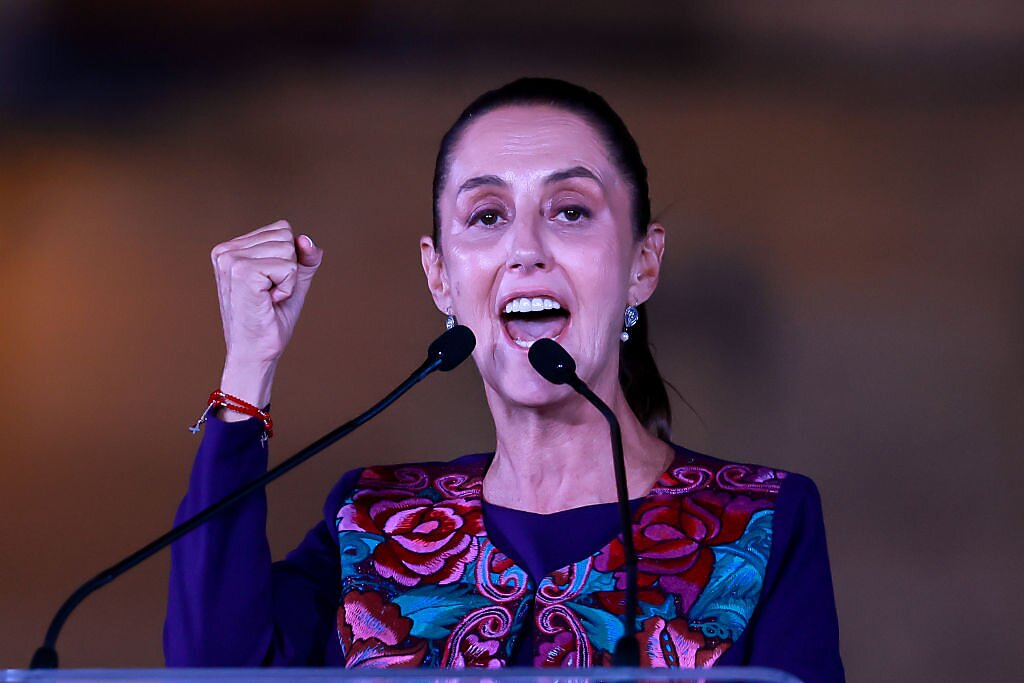On Sunday, 58 percent of Mexican voters elected left-winger Claudia Sheinbaum as president. A former head of government of Mexico City and a close ally of the current president, Andrés Manuel López Obrador (AMLO), Sheinbaum was the continuity candidate. Her overwhelming victory—and the possible qualified majority in both branches of Congress obtained by AMLO and Sheinbaum’s party, Morena, and its allies—also leaves the survival of Mexico’s republican institutions at stake.
AMLO has overseen a drastic increase in violence—including an upshot in political violence, with 34 candidates for public office killed prior to the election—while weakening established political institutions and undermining civil society. According to economist Isaac Katz, AMLO’s presidency has been a “six-year term of destruction.”
AMLO was elected in 2018 under the slogan “hugs, not bullets,” a promise to demilitarize Mexico, where the army has fought the drug cartels since 2006. Once in office, however, AMLO not only maintained the army on the streets. He also gave the Mexican Armed Forces a central role in the management of affairs well beyond the military sphere. These include customs duties, gasoline distribution, and the delivery of school textbooks. The armed forces are also engaged in the construction of infrastructure, including AMLO’s Tren Maya railway in the Yucatán Peninsula. The army’s greater activity has come with greater privileges, especially in the form of a strengthened lobbying capacity and a slew of government contracts.
More power for the military has not brought greater security. During AMLO’s term, 43,000 people have gone missing and there have been over 180,000 homicides, a record in modern times. Cartels control a third of the country. Beyond the drug trade, they engage in human trafficking and the extortion of small and large businesses across Mexico. To protect their turf, criminal organizations have launched a wave of political violence. Hence the systematic murder of candidates in recent months. The violence is not new. During AMLO’s term, 836 attacks have been launched against government employees, candidates, and other individuals active in politics.
Equally alarming has been AMLO’s attack on Mexico’s institutions by weakening the checks and balances that are necessary in any democratic republic. For example, the president has accused the National Electoral Institute (INE), a respected, independent agency of the state, of fraud, and has tried to take away its autonomy, proposing that it be placed under the control of the executive. He also tried to reduce the budget, personnel, and authority of the INE. And, as independent organizations have documented, AMLO’s government threatens press freedom.
During the recent campaign, Sheinbaum ran to the left of AMLO and promised to promote his centralizing agenda. Her main opponent, Xóchitl Gálvez, emphasized the need to defend political pluralism and republican institutions. But it was of little avail.
Morena’s landslide victory in Congress is especially threatening. The INE’s preliminary results, which are yet to be confirmed, give Morena at least 233 seats out of 500 in the Chamber of Deputies, Mexico’s lower house. CNN reports that, along with Morena’s main allies, the Labor Party and the Ecologist Green Party, the new government would count with at least 346 seats, well above the 334 necessary for the qualified majority needed to reform the constitution.
In the Senate, the left-wing coalition needs 85 votes out of 128 to obtain a qualified majority. It is not yet clear whether it will reach this threshold; the preliminary report suggests that pro-AMLO parties will hold between 76 and 88 seats.
AMLO is currently promoting his “Plan C,” a third attempt to implement constitutional and legal reforms before he leaves. These include changes to the constitution that would politicize the Supreme Court and the INE by having their members elected by popular vote.
If a leftist-qualified majority is confirmed, Congress could introduce these reforms when it is inaugurated in early September, weeks before AMLO’s term ends on October 1. Even without a Morena supermajority, members of other parties might still jump on the bandwagon given the president’s popularity and that of his successor.
AMLO’s proposed constitutional reforms pose a threat to freedom. As Katz observed:
“If approved, they will imply the disappearance of the separation of powers by having an all-powerful executive branch in de facto control of the legislative and judicial branches, the disappearance of autonomous bodies, and the destruction of liberal democracy; Mexico would become an openly autocratic, quasi-dictatorial system.”
Although Sheinbaum was the clear favorite before Sunday’s election, the leftist sweep of congressional seats—and possible changes to the constitution—rattled investors. The iShares MSCI Mexico ETF fell by over 10 percent on Monday, while the Mexican peso dropped by over 4 percent. As Reuters reports:
“The latest losses mean the peso has weakened more than 3% since the start of 2024, a sharp turnaround for the currency, which was, until recently, one of the few in emerging markets to have gained ground against a strong dollar this year.”
Financial markets reflect the concern that the reelection of AMLO’s party—with its unequivocal electoral strength—means that freedom in Mexico will continue to decline.

